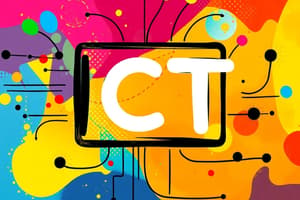Podcast
Questions and Answers
What does ICT stand for?
What does ICT stand for?
Information and Communication Technology
What are the components of ICT?
What are the components of ICT?
Hardware, software, networks, and data
Why is ICT important in education?
Why is ICT important in education?
It enhances learning experiences and provides access to a vast amount of information.
What are some benefits of integrating ICT in teaching and learning? (Select all that apply)
What are some benefits of integrating ICT in teaching and learning? (Select all that apply)
What challenges might arise from integrating ICT in education? (Select all that apply)
What challenges might arise from integrating ICT in education? (Select all that apply)
Which of the following is NOT a component of ICT?
Which of the following is NOT a component of ICT?
What potential impact might ICT have on educators?
What potential impact might ICT have on educators?
Which of the following best describes a challenge of integrating ICT in education?
Which of the following best describes a challenge of integrating ICT in education?
In discussing the myths and realities of ICT in education, which statement could be considered a misconception?
In discussing the myths and realities of ICT in education, which statement could be considered a misconception?
What critical thinking aspect should be encouraged regarding the future of ICT in education?
What critical thinking aspect should be encouraged regarding the future of ICT in education?
Flashcards are hidden until you start studying
Study Notes
Introduction to ICT in Education
- ICT stands for Information and Communication Technology, encompassing a range of technologies used to manage and share information.
- Key components of ICT include hardware (computers, tablets), software (educational applications), networks (internet connectivity), and digital content.
Importance of ICT in Education
- Enhances teaching and learning experiences by providing diverse resources and learning tools.
- Facilitates access to information, enabling self-directed learning and research habits among students.
- Promotes collaboration and communication between students, teachers, and educational institutions globally.
Benefits of Integrating ICT
- Encourages interactive and engaging learning environments, catering to different learning styles.
- Provides opportunities for personalized learning through adaptive learning technologies.
- Supports the development of essential digital skills needed in the modern workforce.
Challenges of Integrating ICT
- Requires training and professional development for educators to use technology effectively.
- Potential disparities in access to technology may widen the educational gap among students.
- Over-reliance on technology could hinder critical thinking and problem-solving skills.
Future Considerations of ICT in Education
- Critical thinking about ethical implications and data privacy in adopting technology in education.
- The potential of emerging technologies, like AI and VR, to revolutionize traditional teaching methods.
- Encouragement of ongoing assessments of ICT effectiveness in educational outcomes and adaptability to future needs.
Introduction to ICT in Education
- ICT stands for Information and Communication Technology, encompassing a range of technologies used to manage and share information.
- Key components of ICT include hardware (computers, tablets), software (educational applications), networks (internet connectivity), and digital content.
Importance of ICT in Education
- Enhances teaching and learning experiences by providing diverse resources and learning tools.
- Facilitates access to information, enabling self-directed learning and research habits among students.
- Promotes collaboration and communication between students, teachers, and educational institutions globally.
Benefits of Integrating ICT
- Encourages interactive and engaging learning environments, catering to different learning styles.
- Provides opportunities for personalized learning through adaptive learning technologies.
- Supports the development of essential digital skills needed in the modern workforce.
Challenges of Integrating ICT
- Requires training and professional development for educators to use technology effectively.
- Potential disparities in access to technology may widen the educational gap among students.
- Over-reliance on technology could hinder critical thinking and problem-solving skills.
Future Considerations of ICT in Education
- Critical thinking about ethical implications and data privacy in adopting technology in education.
- The potential of emerging technologies, like AI and VR, to revolutionize traditional teaching methods.
- Encouragement of ongoing assessments of ICT effectiveness in educational outcomes and adaptability to future needs.
Studying That Suits You
Use AI to generate personalized quizzes and flashcards to suit your learning preferences.




